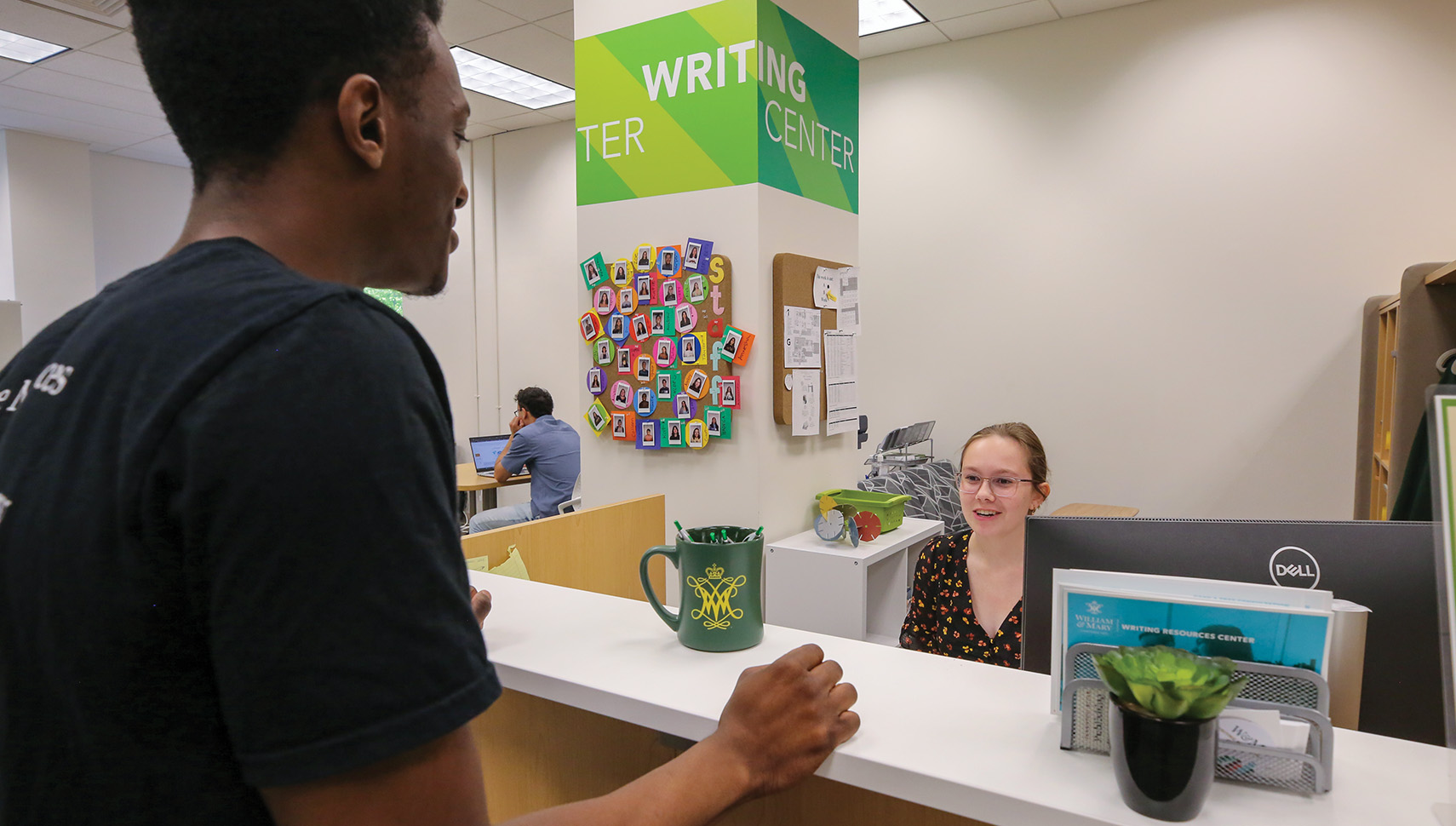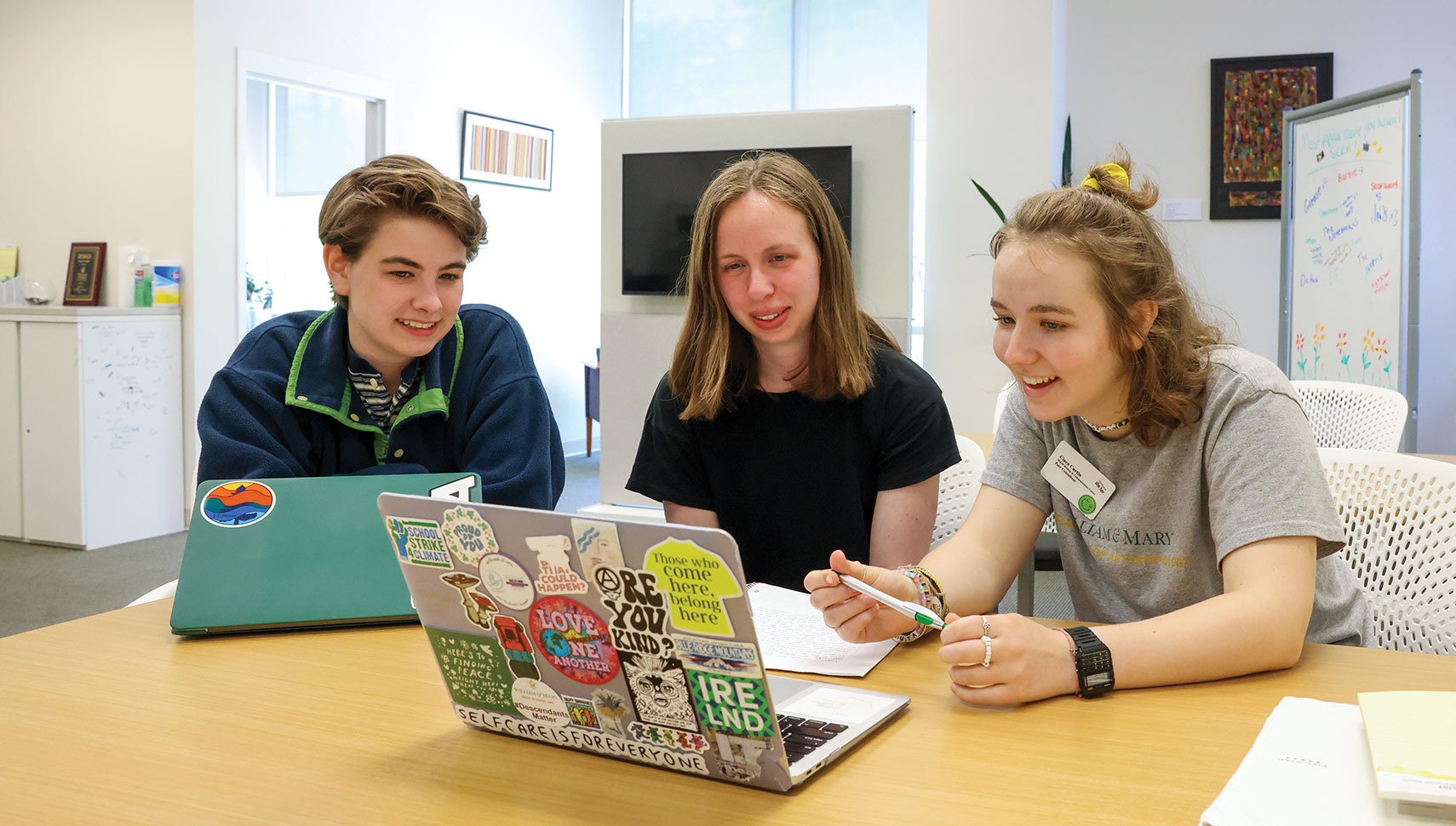A New Chapter for the Writing Center
Name change reflects its mission to grow the communication skills students need at W&M and beyond
June 4, 2024
By
Mary Beth Bauermann ’24

The William & Mary Writing Resources Center has always been about more than just writing. Staffed by trained undergraduate students known as consultants, the center helps students with all forms of communication. Both the consultants and their consultees use the skills they learn in a wide variety of careers after graduation.
This past January, to better reflect the communication skill development it provides, the center was renamed the W&M Writing and Communication Center.
A staple of the William & Mary community since its opening in 1987, the center serves a significant portion of the student population each year. In the 2022-2023 school year, with a staff of 34 undergraduate consultants in the fall and 13 more trainees in the spring, the center saw 801 clients and conducted 1,724 appointments.
Director Lori Jacobson says the name change speaks to how multimodal projects are becoming more prevalent in higher education and professional careers. From her perspective as an English professor and a writing studies scholar, Jacobson says, “Forms of digital composing are becoming more common in academic communications.”
“William & Mary students write a lot of academic essays, so we know that the support is needed and valued, but we help with other kinds of communication as well,” she says. “We think of it as writing writ large, writing in all its forms.”
The WCC advertises that it can provide support with essays, presentations, podcast scripts, multimedia projects and digital communication.
“We think the new name reflects what we were already doing, helping students with multimodal communication with presentations, but also with things that we would like to help them navigate in the future,” Jacobson says.

The Writing and Communication Center is staffed by 40 undergraduate students who undergo a semester of training and, upon completion of the training course and a shadowing process, work as peer consultants. Consultant alumni, who have gone on to thrive in a wide variety of professional careers inside and outside of professional writing and academic fields, serve as a testament to the center’s long-lasting commitment to promoting communication skills to student consultees and peer consultants alike.
They cite these interpersonal skills as primary takeaways from their time in the writing center.
Recent writing consultant Lauren Wilson ’22 says she learned how to be a better listener, which is helpful when facing an unfamiliar subject.
“As a peer consultant, I collaborated with students working in all disciplines and supported them using techniques that best fit their learning styles,” says Wilson, who now works as a publicity assistant at Bloomsbury Publishing. In that role, she continues to benefit from the skills she acquired while working in the writing center.
“I work on a wide variety of titles every season, from literary fiction to cookbooks to serious nonfiction,” she says. “As a publicist, it’s crucial that I effectively communicate my authors’ ideas to the media so that their books find their readerships.”
In addition to developing listening and empathy skills, Sydney Hamrick ’21, M.A.Ed. ’22 and Alex Johnson ’22, M.A.Ed. ’23 learned crucial lessons in leadership and guiding students’ discovery. They were student administrators, a two-year role in which two student consultants take on additional administrative duties, acting as a liaison between Jacobson and the staff. Both are now English teachers at Fairfax High School. Hamrick recently started a writing center at the school, providing students with early training as peer writing consultants. She emphasizes active listening and asking questions — two skills she developed when she worked as a consultant in her own high school and at W&M. While her writing center is in its early stages, she strives to cultivate an experience for student consultants that prioritizes professional communication and student leadership opportunities.
Another former student writing center administrator, Jackie Keshner ’19, cites the adaptive communication skills she built there as one of her strengths. Keshner is an investor relations director at Gateway Group, a firm that provides strategic financial communications services in Newport Beach, California. At W&M, she majored in English with a minor in economics. When she initially joined the job market, she says, she hadn’t previously considered a job in finance. However, Gateway Group was looking for both business and English majors with strong communication skills. She took the plunge and today, she leads comprehensive investor relations campaigns at the firm.
As a writing consultant, she learned that “it’s more about you asking questions and encouraging the consultee to speak than it is you having to know all the answers.” In her investor relations work, asking questions ensures her clients feel heard and understood, she adds. “It’s also an opportunity for me to just keep learning how to help in an empathetic and thoughtful way.”
Keshner’s goal is to make information “accessible to an ever increasing and evolving audience,” a hallmark of the Writing and Communication Center’s goals for the future. In her job, she frequently encounters the challenge of sharing items such as earnings releases and investor presentations with different audiences, requiring various approaches to frame the information accessibly.
“An earnings release, for example, could be read by someone who’s been invested in this company for years, or the audience could be a first-time investor who just bought their first stock and is brand new to finance terms,” she says. “I have a lot of empathy for that person because I was that person coming into this.”
The name change is only the beginning of a new chapter of growth for the W&M Writing and Communication Center, which plans to continue to adjust to trends and innovations in communication.
“We know that communication is changing,” Jacobson says. She specifically points to the rise of data visualization: “Data is a big part of the way people think about the world and the kinds of questions they ask.”
Keshner attests to the importance of being able to effectively communicate data, as she regularly makes investor presentations that include graphical representations of revenue and financial trajectory.
The WCC aspires to better support students in data visualization or narrative visualization of data, as well as “whatever future students need support within terms of their communication skills,” Jacobson says.
“We are ready and excited about the possibilities for the future,” she says. “We think the name change is a signal for the kinds of things we are already doing and the things we aspire to do.”